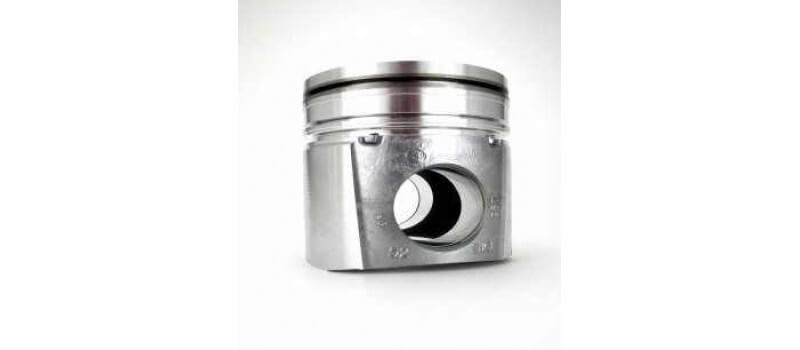So that you can take action before any damage affects the engine, we’ve compiled a list of the most common and specific causes of piston damage to ensure you can easily recognise the problem.

Common Causes of Piston Damage
1. Burned Piston
A burned piston can be seen instantly once the top of the engine has been removed. You should be able to recognise visible signs of melting and sometimes a burnt hole in the piston. A burned diesel piston is generally caused by dirty fuel injectors being used.
2. Cracked Piston
Cracked piston causes can include continued use of low-quality fuel. Or, a cracked piston can be a result of the failure of the exhaust gas recirculation system.
3. Snapped Timing Belt
The timing belt plays a key role as it keeps the movement of the pistons and the valves in perfect alternating time. Once the belt has snapped, it can cause a collision between the two which can then lead to further damage. To prevent the timing belt from snapping, it’s important to change the timing belt according to the car manufacturer’s instructions.
Specific Causes of Piston Damage
1. Worn Diesel Piston Rings
If you’ve noticed white smoke coming from the tailpipe, low power for acceleration, overall power loss and also a significant drop in engine oil level these are key signs of worn diesel piston rings.
Your engine may experience these signs of piston ring damage as the seal between the piston and cylinder is no longer airtight, meaning the oil will leak into the crankcase and the firing chamber.
Worn diesel piston rings are a very common cause of piston damage, as the diesel rings circle around the piston act as a buffer between the combustion chamber and the crankcase, surrounding the crankshaft. Diesel rings are responsible for moving the heat away to the cylinder wall, whilst regulating the oil temperature.
Unfortunately, piston rings do wear out, and there is little you can do to prevent this. However, if you replace them routinely before they wear, it can play a great part in preventing damage to the engine.
2. Piston Skirt Damage
The main cause of damage on the piston skirt is caused by rubble coming through the air filtering system. This can cause the piston rock within the cylinder to wear the skirt down, making the skirt thinner and weaker, which can eventually result in the piston breaking.
3. Piston Snap
If your car is starting to make a rattling or knocking noises that remains by the time the car has warmed up, this could mean that there is a large gap between the piston and the cylinder wall.
Piston damage can be very expensive due to the intensive labour involved to ensure the engine piston parts are fixed. This cost is usually high as the entire engine has to be taken apart for any issue to be resolved.
To prevent piston damage and failure, whether that’s diesel piston rings or other specific engine piston parts, ensure you are using the correct engine oil and that the oil and filter are changed at the recommended intervals by the manufacturer. You should also make sure the engine coolant is in good condition, which you can check by opening the radiator cap, or you can take a look at the water in the coolant reservoir.
It’s important to remember that diesel pistons are part of the overall engine and all diesel engines are different. Unfortunately, there’s no ‘one size fits all’ solution for anyone experiencing a diesel engine problem or an issue with their diesel rings. It’s also imperative to determine the cause of the problem and address this, before simply replacing damaged parts and re-assembling the engine.